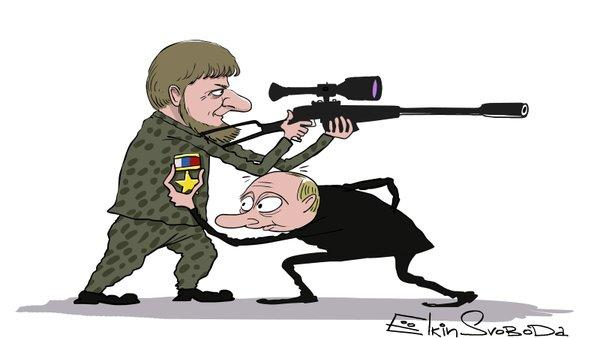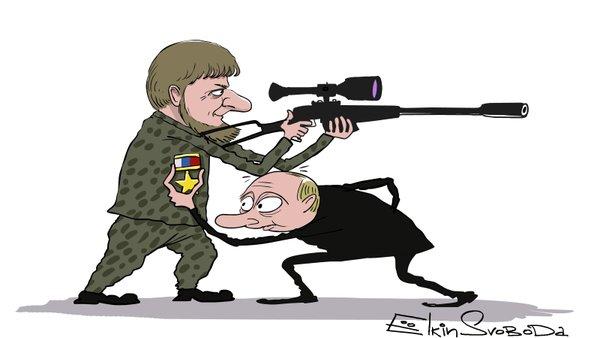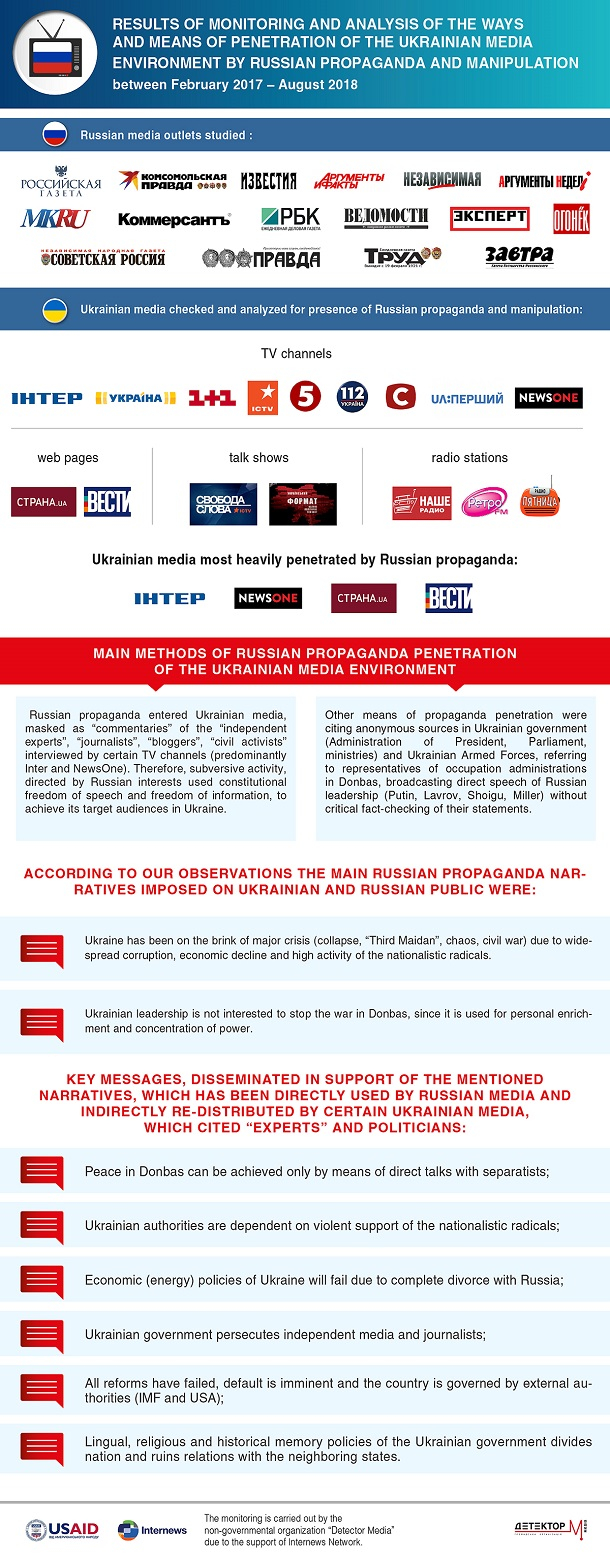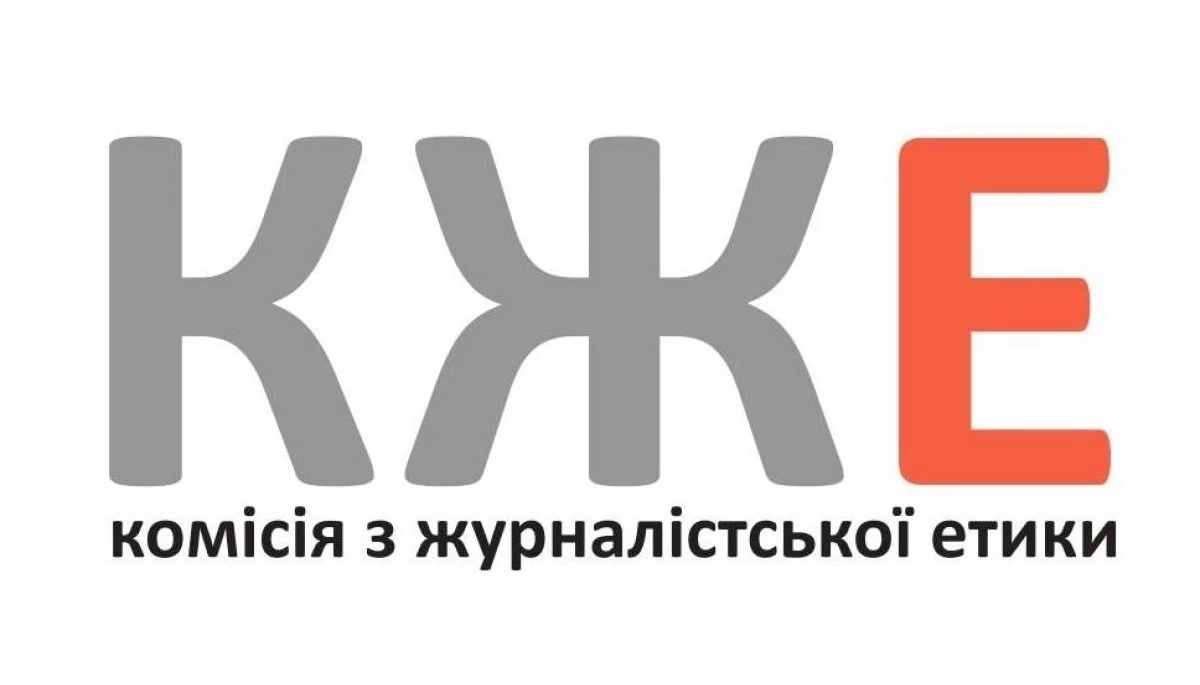
“Who hasn’t got the idea will get it anyway”: Russian propaganda on Ukrainian television
“Who hasn’t got the idea will get it anyway”: Russian propaganda on Ukrainian television


Україномовна версія цього звіту доступна тут.
Previous Detector Media research projects and polls, dealing with Russian propaganda influences in Ukraine during and after Euromaidan, proved that the means of content manufacturing and ways of its delivery to the target audiences in Ukraine are in flux and can be accommodated to changing situation in Ukraine. Although Ukrainian government and civil society have done a lot to protect country from subversive attacks via traditional and new media, exposure of the more developed and stronger western democracies to Russian meddling in elections urged us to continue monitoring and analysis of the eventual Russian influence in the Ukrainian media environment.
We assume that in Russian centralized system of governmental control over media policy and hierarchical management of media assets there is high coherence and integrity between tasks and actions when it comes to disseminating propaganda messages about Ukraine to both domestic and foreign audiences.
Therefore, between February 2017 and August 2018 on monthly basis we closely examined how “Ukrainian issues” were covered by number of the most popular and authoritative (establishment) Russian media outlets. Among them are: “Rossiyskaya Gazeta”, “Komsomolskaya pravda”, “Izvestiya”, “Argumenty i Fakty”, “Nezavisimaya Gazeta”, “Argumenty Nedeli”, “Moskovskiy Komsomolets”, “RBK-gazeta”, “Vedomosti”, “Ekspert”, “Ogonyok”, “Sovetskaya Rossiya”, “Pravda”, “Trud”, “Zavtra”.
Simultaneously, we analyzed content of the TV news (evening programs) of such Ukrainian TV channels as: “Inter”, TRK “Ukraina”, TRK “1+1”, ICTV, 5 channel, 112 channel, STB, “UA: Pershyi”, NewsOne. Since beginning of 2018 we were able to conduct permanent monitoring of Internet-media “Strana.UA” and “Vesti-ukr.net”. From June 2018 we has got opportunity to analyze content of the all daily TV news in all major channels, certain talk-shows (Svoboda Slova by ICTV and Ukrainskyi Format by NewsOne) and monitor number of the radio stations and local TV channels.
According to our observations the main Russian propaganda narratives imposed on Ukrainian and Russian public were:
- Ukraine has been on the brink of major crisis (collapse, “Third Maidan”, chaos, civil war) due to widespread corruption, economic decline and high activity of the nationalistic radicals.
- Ukrainian leadership is not interested to stop the war in Donbas, since it is used for personal enrichment and concentration of power.
There were a number of key messages, disseminated in support of the mentioned narratives, which has been directly used by Russian media and indirectly re-distributed by certain Ukrainian media, which cited “experts” and politicians:
- Peace in Donbas can be achieved only by means of direct talks with separatists;
- Ukrainianauthoritiesaredependentonviolentsupport of the nationalistic radicals:
- Economic (energy) policiesofUkrainewillfailduetocompletedivorcewithRussia;
- Ukrainiangovernmentpersecutesindependentmediaandjournalists;
- Allreformshavefailed, default is imminent and the country is governed by external authorities (IMF and USA);
- Lingual, religiousandhistoricalmemorypoliciesoftheUkrainiangovernmentdividesnationandruinsrelationswiththe neighboringstates.
Monitoring provided enough evidence to assume that while covering “Ukrainian issues” Russia media used them as additional tool to shape public opinion about domestic issues. For instance, they discussed corruption inside Poroshenko’s team when opposition attacked corruption of the Putin’s men; topic of war in Donbas and developments of the international negotiations about conflict resolution – before and after important meetings between Putin and foreign leaders; topics of economic and demographic troubles of Ukraine – to illustrate strength of the economic policies of the Russian government, especially on the eve of presidential elections in 2018.
Russian propaganda entered Ukrainian media, masked as “commentaries” of the “independent experts”, “journalists”, “bloggers”, “civil activists” interviewed by certain TV channels (predominantly Inter and NewsOne). Therefore, subversive activity, directed by Russian interests used constitutional freedom of speech and freedom of information, to achieve its target audiences in Ukraine.
Other means of propaganda penetration were citing anonymous sources in Ukrainian government (Administration of President, Parliament, ministries) and Ukrainian Armed Forces, referring to representatives of occupation administrations in Donbas, broadcasting direct speech of Russian leadership (Putin, Lavrov, Shoigu, Miller) without critical fact-checking of their statements.
We should also admit that in 2017-2018 TV channels Inter, NewsOne and to some extent TRK “Ukraina” (only in February-April 2017) were used as tools of dissemination of questionable, post-truth, statements, assessments and news which were favorable for the political interests of their owners, who have been active politicians (members of parliament) and leaders of political parties “Opposition Bloc” and “Za Zhyttia” (For Life).
As a result audiences of the mentioned TV channels became soft targets for ideological brainwashing with messages that overlapped or even echoed Russian propaganda messages. For instance, since May 2017 representatives of the “Opposition Bloc” has been speaking about “religious war” in Ukraine, since September 2017 they have also pushing for peace be means of direct negotiations with separatists and “special status” for Donbas as prerequisite for UN peacekeeping mission (which is Putin’s official demand).
In certain cases (clashes over Sberbank siege, mutual lawsuits between Gazprom and Naftogaz, promotion of Viktor Medvedchuk’s role in release of POWs and political prisoners from Russia) several TV channels produced unbalanced news, favorable to certain stakeholder. We suppose that timing and content of such news broadcasting were pre-paid by interested stakeholder. Thus we are concerned that during election campaigns of 2019 (presidential and parliamentary) Russian messages will be disseminated through informal channels of masked pre-paid news (dzhinsa, or jeans news) ordered by certain political parties and leaders.
It is important to say that the comparability between Russian propaganda and unbalanced, manipulative news in Ukrainian TV was detected when Ukrainian authorities achieved significant successes such as visa-free regime with the EU, favorable ruling of the Arbitration Institute of the Stockholm Chamber of Commerce, enforcement of anti-Russian EU and US sanctions.
The strongest impact of Russian propaganda was delivered by the actions of the Ukrainian politicians. We might suggest that such leaders as Yuriy Boyko, Yulia Tymoshenko, Vadym Rabinovych, Yevhen Muraiev, and Viktor Medvedchuk made use of certain issues and messages because they were confident, due to sociological surveys, that such rhetoric connects them with the certain target groups of Ukrainian voters. As a matter of fact these can be the same messages Russia is using to keep its influence and presence in Ukraine public discourse.
Additionally, public violent actions of certain organizations and groups, which position themselves as nationalists, were consistently covered by the Russian and some Ukrainian media to illustrate growing “neo-Nazi threat” in Ukraine. The omnipotence and omnipresence of new media made it possible for Russian propaganda tools to hyperbolize (create hype) marginal outsiders and their actions and position them as socially acceptable and influential in Ukraine
In our opinion, in all mentioned cases most Ukrainian media were just tools in hands of Ukrainian politicians. However, there are several exceptions. We argue that our qualitative content analysis of the news and articles of the two popular Internet-media, namely “Strana” and “Vesti” shows that they follow hidden pro-Russian agenda in their work. Specifically, Strana and Vesti actively repeated Russian propaganda messages while covering military escalations in Donbas and attacking proponents of establishment of autocephalous Ukrainian Orthodox Church.
To sum it up we may say that presence of Russian propaganda in Ukrainian media environment is possible due to certain habits, attitudes and stereotypes about Russia shared by certain part of Ukrainian society. Consequently, politicians and politically managed media are tempted to repeat foreign hostile propaganda and use it for their goals.
Since constitutional freedoms of speech and information are inviolable, tackling Russian propaganda in its present state by bans or constrains will not be efficient if mainstream media are controlled by political parties and news rooms are run by shadow political masterminds. If before the war it was urgent to demand protect state institutions from capturing by business interests, it is urgent now to call for releasing media from political influence of their owners and increasing level of critical thinking among people (both journalists and audience).













